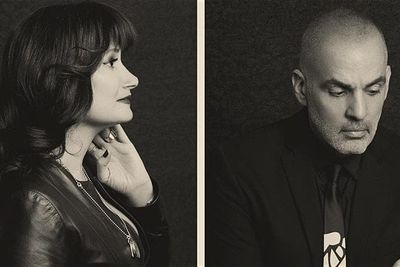Of the many contradictory impulses that arise from the protean, gentrifying spaces of the city, one of the positive developments of the New Nashville is that we’re getting synth-pop shows again. For awhile there, after the unconscionable betrayal of WRVU listeners by Vanderbilt University and the gradual attrition of performing spaces friendly to synths and queer artists (and their audiences), it felt like other than the occasional P.A. at a dance club or the occasional opening gig for a newer artist, to see any of the true synth-pop legends required a trip to Atlanta or Tampa or Dallas. It was almost thirty years after Depeche Mode’s legendarily underattended 1988 show at Starwood Amphitheatre (immortalized in the 101 documentary) before they would return to Nashville, triumphantly selling out downtown’s Ascend Amphitheatre. So thankfully, we’ve got the people in town who love the big beats, big choruses, and cool excitement of classic synth-pop.
Which brings us to Book of Love, the brainchild of Philadelphia art students with a love for ‘60s songs and ‘80s tech. A mixed-gender, multiracial quartet representing a continuum of sexualities, they unleashed a string of club hits for nearly a decade, with their 1988 medley of “Pretty Boys and Pretty Girls” and a cover of Mike Oldfield’s “Tubular Bells” the kind of enduring classic on alternative radio that listeners to the sorely-missed 91.1 FM would groove on throughout the city, and then on through the decades thanks to its appearance in the Mary Harron adaptation of American Psycho. It was the first time a major label artist would mention AIDS and safe sex, and it was the biggest hit of their career.
“Boy,” their first single, was legendary, both for its directness and its adventurous content. A plaintive lament about gender-exclusionary door policies at gay clubs, it struck a chord with everyone feeling alienated because of sexuality and managed to teach some short-sighted gays about being better people. “Modigliani (Lost in Your Eyes)” has symphonic sweep and the deepest emotional resonance, presiding over both poles of ‘80s remix culture; the Omar Santana deconstruction ‘Mo-Dub-iani’ and the glorious, ambient ‘Requiem Mass’ version, immortalized in both the film Planes, Trains and Automobiles and on the show Miami Vice in what is the first narrative portrayal of an AIDS hospice.
In places like Lubbock’s Club 100 (and countless other mixed and queer clubs of the ‘80s), “I Touch Roses” set crowds into motion, what with its gorgeous panning guitar sample and simultaneous exultation of fairytale whimsy and druggy nightlife euphoria. And on it went for four albums (1988’s Lullaby, coproduced by Ted Ottaviano and Flood), with 1993’s Lovebubble album letting the band explore the rave and X-Beat scenes with the indelible “Boy Pop” (“on the bottom or the top, when we go, we go pop”) connecting with listeners whether in its Philly breakbeat remix by Josh Wink or with the deeply slutty Mood II Swing Mixes.
Nowadays, Book of Love tours as a duo, with Susan Ottaviano and Ted Ottaviano (no relation) on the road and bringing electronic joy to the people (though occasionally the other founding members, Jade Lee and Lauren Roselli, will pop up for shows).
They’re coming to Nashville on Saturday, February 8th, and playing at the Mercy Lounge (tickets are still available). The last time they came through town, it was at 328 Performance Hall.The city has changed a lot since then. And so have the people. But the thing about those songs we love- the circumstances around them, the ears with which we hear them- they remain. They endure. And for an hour and a half, we can have those little slices of time back. To quote the great philosopher Sterling Void, “I hope it’s gonna be alright; I hope the music plays forever.”
For more by Jason Shawhan, click here!
